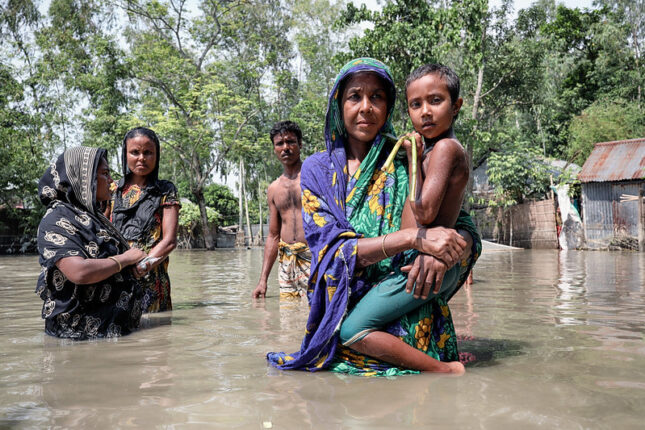-
Climate Change and Gender Roles: Women’s Active Role in Adaptation
June 12, 2024 By Sarah B. Barnes
“The success or failure of any adaptation strategy or action highly depends on the understanding of the capacities of a community or an individual to adapt to climate-associated risks,” write the authors of a recent systematic review of literature, Gender and Adaptive Capacity in Climate Change Scholarship of Developing Countries.
This 2023 review explores 59 articles published between 2010 and 2020 (primarily in African and Asian nations) to highlight how women’s agency and skills need to be prioritized in any adaptation strategy—especially given the gendered effects of climate change. It focuses on women’s vulnerability to climate change impacts, particularly regarding lack of access to information, resources, and capital; gender inequalities related to decision-making, power, asset holding, and violence; and ongoing responsibilities for everyday activities, including household work, farming, family caregiving and health, and food security.
“Climate change vulnerability reflects and reinforces gender disparities,” write the authors. They note that patriarchal social and cultural norms that dictate gender roles are the main drivers of women’s increased risks and challenges regarding their individual agency and adaptation efforts in response to the ongoing climate crisis. Women in patriarchal societies of developing countries are often defined by their father’s or husband’s position in that society, as well as hold limited financial authority. These circumstances increase climate-related vulnerabilities while simultaneously limiting the capacity of women to respond to climate challenges.
The authors argue that existing research on climate adaptation tends to insufficiently address overlapping dynamics of gender, race, ethnicity, culture, economy, age, class, and disability, nor do they analyze the role they can play in an individual’s agency to address climate change. They also stress the need for more exploration on the ability of women to make meaningful and strategic decisions in this space: “The literature has inadequately looked at the possible roles of social norms in having underlying effects on the decision-making process of women in supporting effective and efficient adaptation.”
One recent study looks to address the limitations of earlier studies by exploring the role of women in decision making and response actions in the context of rural Bangladesh, a region which is prone to both climate-related disasters and patriarchal social norms. Using results from 20 village-based focus group discussions, The Importance of Women’s Roles in Adaptive Capacity and Resilience to Flooding in Rural Bangladesh examines how the interactions of human, social, financial, natural, and physical capital shape adaptive capacity to floods.
The study focuses on a rural part of northern Bangladesh where women typically have less education, power, and decision-making capabilities than men, as well as fewer financial resources, limited land ownership and agricultural assistance from government agencies, and more restricted travel. Yet the researchers observe that these women continue to play an important role in climate adaptation responses: “A first step in addressing such gender-based inequalities in disaster contexts is to recognize and acknowledge the varied contributions made by women when a flood strikes.”
The qualitative discussions with both men and women in the region revealed that women with primary or secondary education played key roles to address flooding, including examples of disease management and treating diarrhea and examples centered on household management skills, particularly related to food preservation. During flooding, women also assumed new roles related to disaster preparedness, food security, safe water sources, and farm management, as well as increased their existing roles as caregivers of the young, elderly, and disabled members of the household.
Interestingly, women’s social contributions during climate disasters were also noted by the authors of the study. Discussants stressed that women’s social capital and ability to organize and motivate family and community members were critical to immediate responses and long-term survival. “Women use bonding, bridging, and linking social capital as a vital adaptive capacity resource against floods,” they write. And while men typically were found to have more access to banks and loaning organizations, women were found to play dominant roles in accessing relief from non-government organization or from women’s empowerment programs and grassroots organizations.
Read More:
- Midwives play a key role in delivering environmentally sustainable health services, adapting health systems to climate change, and as first responders when climate-related disasters occur.
- In a recent issue of the Global Health & Gender Policy Brief series, authors note the increasing impacts of climate change on maternal and newborn health.
- Policy solutions are needed to mitigate the impact of extreme heat on maternal and newborn health.
Sources: Science Direct, Taylor & Francis Online, and USAID.
Photo Credit: A family in Bangladesh coping with recent flooding in a nearby shelter. UN Women/Mohammad Rakibul Hasan, flickr.com.
Topics: adaptation, behavior change, climate, climate change, Dot-Mom, flooding, gender, Reading Radar
 A Publication of the Stimson Center.
A Publication of the Stimson Center.






